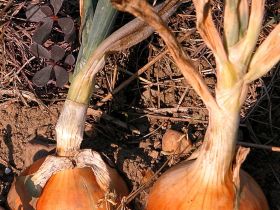Onions
 Buy Onions seeds and plants online
Buy Onions seeds and plants online Onions are a delicious and healthy addition to any vegetable patch. They can be grown from seed though this is slow and can be a bit fiddly. Many gardeners choose to take the far easier route and grow onions from sets, which are immature onion bulbs. When grown from sets, onions are easy and hassle free to grow. There are a variety of onions, both white and red. Though dry bulb onions are unknown in the wild, they have been cultivated for at least 7000 years.
Growing Onions:
Onions that are started from seed should be sown indoors in a warm spot for at least six-eight weeks before hardening off and planting out after all risk of frost has passed and when green onions shoots are pencil thick. Onion seedlings should be planted out at at least 7.5cm intervals unless you want to create sets to plant next year. If you do want to create sets then crowd onion seedlings together so only small bulbs are formed. These can then be stored and planted the following year.
Planting from sets, onions that were planted from seed last year, is far easier for a novice gardener, though it is also a more expensive way of doing it. Sets are planted out in March or April, a little earlier if planting undercover in a greenhouse or polytunnel. Plant gently into the soil with just the tops showing, around 10cm apart. Watch out for birds lifting the sets.
Onions need a sheltered site and prefer sunny, well-drained soil. Water onions if the weather is dry but avoid over watering. Wet ground or too much rain can make diseases or fungal infections more likely. Onions bulbs are fully mature when foliage turns yellow and falls over in late summer. You can eat bulbs before this point, but this is the signal to bring in your harvest.
Before storing, bulbs must be dried by leaving them out in the sun or in a polytunnel, greenhouse or shed if the weather is wet. The drying will take around two-three weeks. After this, onions can be braided for storage.
Why grow onions in the garden?
As well as providing flavour and interest to our diet, onions and other members of the allium family are particularly useful in the garden. They can be extremely useful as pest deterrents/distractions and as companion plants.
Studies have suggested that onions are beneficial companions for a wide range of other plants, including brassicas, beetroot, carrots, lettuce and cucumbers. Some of these interactions are also of benefit to the onion as well as its plant companion.
Onions are extremely good for you and should form a regular part of the diet. They are an essential part of any kitchen garden.
 Buy Onions seeds and plants online
Buy Onions seeds and plants online 